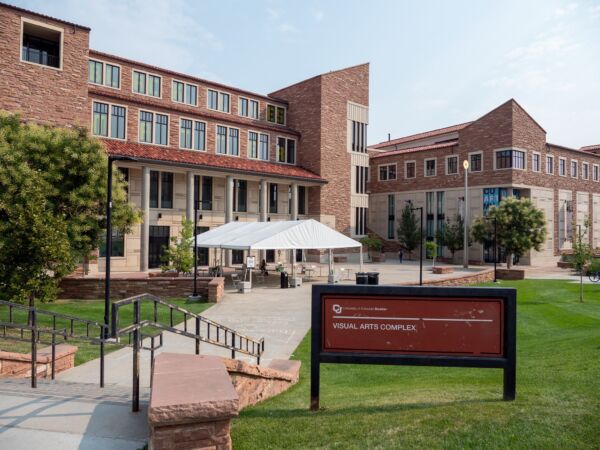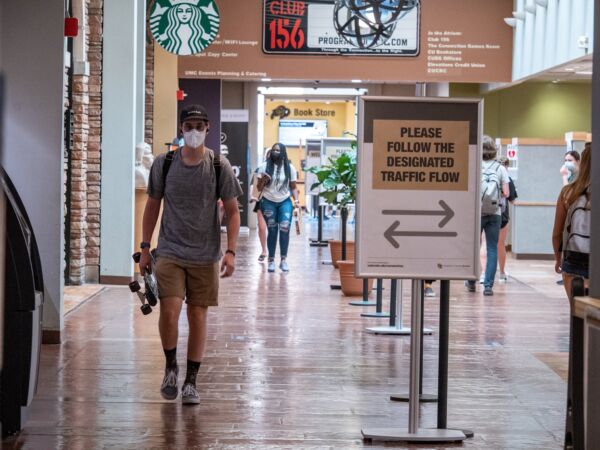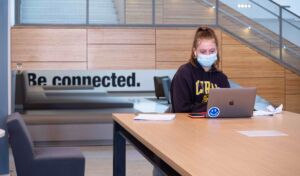From a Hustling, Bustling Campus to a Ghost Town: The Impact of COVID-19 on CU Boulder
By Abby Schirmacher

The class of 2024 will never know what it feels like to be a college freshmen under “normal” circumstances. A year ago, Norlin Quad was alive with groups of students congregating before classes. The Chem 140 auditorium was filled to the brim with massive lectures and served as a meeting place for many clubs and organizations on campus. The Hill never slept and neither did the CU Boulder campus.
This year looks very different.
We’ve been dealing with the coronavirus for quite some time now, and the university has adjusted accordingly. Students, professors, administrators and faculty alike still reminisce on what life once was as a member of the CU Boulder community in hopes that sometime soon, operations will return to normal.
Higher education transitioned to remote learning with some bumps in the road last year, and while the university aspired to offer in-person instruction to an extent this semester, many classes remain online. For some disciplines, the transition was easier than for others.

Associate professor Stacey Dewitt Smith in the Smith Lab Department of Ecology and Evolutionary Biology at CU Boulder faced several obstacles in moving towards remote instruction. Smith has been at the university since 2013, and she has become accustomed to using tools in the classroom like a chalkboard. Once the pandemic hit, everything changed.
In the process of relearning how to teach online, Smith’s students provided the support she needed to be successful. “My students were amazing,” she says, referring to the helpfulness of her students as she learned to use Zoom. She explains that one student showed her that “teamwork makes the dream work because I’d be like, ‘I don’t know how to fix this,’ and one of my students goes, ‘Okay, click on the little participants link on the bottom.’ You know, basically my students taught me all the tricks.”
Though learning to facilitate labs remotely has been difficult, Smith is grateful for her students and their patience throughout the entire process.
Patience is something that Christine Mahoney, the internship coordinator at the College of Media, Communication and Information here at CU Boulder, is all too familiar with. Her position has changed following the initial campus closure due to COVID-19, as she used to manage the employer-relations aspects of CMCI as well as career services assistance. Now, Mahoney is also teaching TV reporting, an upper-division journalism class. As a former TV reporter, bringing her real-world experience to the classroom is an exciting venture.
Mahoney especially enjoys this new position, as it allows her “to be able to get back into it and share my experience and expertise and connections with students in that way, so I really like it. It’s a nice small class,” she says.
As for building a curriculum remotely, Mahoney has worked tirelessly to provide as many resources as possible for her students to be successful. She takes pride in grading assignments promptly, communicating with students often and serving as a support system for students during a difficult time to attend college.
“I had a unique advantage in that I have a daughter, who is a sophomore in college and uses Canvas, not at CU Boulder at a different school, but when she was home for winter break, I said, ‘Let’s look at your classes and I want to see examples of things you really liked about how your professors organized things on Canvas and what you hate.’ And so we went through and looked at her previous quarter classes and I got some really good tips on organizing the course on Canvas–because although I have taught that course before, I had never taught that course remotely.”
Understanding Canvas allowed Mahoney to structure her class effectively and provide support for her students despite the many issues that could arise with remote learning. The pandemic adds additional stressors to students’ lives, so anything that professors can do to establish a welcoming and understanding environment is necessary.
“So I wanted to, from an organizational standpoint, make it as easy as possible for the students to see the syllabus, what’s coming up, make announcements if I make changes, keep the gradebook up to date […] I’m trying to alleviate any anxiety,” she said.
Regarding the other portion of Mahoney’s role, internships also changed drastically as a result of the virus. Previously, internship programs were primarily offered in-person to establish valuable connections and meaningful experiences in the real world. Once the pandemic hit, employers and career services on campus were forced to accomodate students remotely. This spring, internship attendance increased as employers adjusted to remote opportunities.
“We worked really hard in the fall to make sure that employers and students were engaged for spring 2021, and our numbers rebounded. So right now, we have close to a normal amount of students earning internship credit […] so we are almost back to pre-pandemic numbers in terms of numbers of students earning internship credit in a spring semester,” Mahoney says.

CMCI recorded 86 attendees at the spring 2021 career fair and 32 paid interns in spring of 2021. These numbers are much lower than normal, as student engagement is sparse due to Zoom fatigue from spending days on end on a computer screen. However, there are some benefits to the virtual world, as it is much more accessible to attend these events virtually and to complete remote internships.
Mahoney explains that industries related to the areas of study in CMCI, specifically, have shifted to the point where smaller, local businesses are now offering more internships than larger corporations. As a result, students are still finding internship opportunities, but they may be more likely to connect to smaller establishments based in the Boulder or Denver area. Likely, the positions are unpaid.
“We have all hands on deck just with our own staff, so we’ve noticed that students trying to get internships at larger established media corporations might be having a harder time because those programs have been reduced or curtailed,” Mahoney says.
Industry changes when it comes to hiring student interns is something Dylan Mark, a professional experiences program manager for CU Boulder, has witnessed throughout his time overseeing internship programming and the coordination of the policies and production of internships on campus. Mark saw how quickly employers recognized the need for remote internships to provide experience for students, especially during a pandemic.
“Back in 2013, you might have only seen 20 to 50 remote internships at a time and a lot of those internships wouldn’t be really high quality. Over the last year, we’ve seen this huge growth in investment in our employers in hiring remote positions and being able to adapt to the pandemic,” he explains.
Surprisingly, Mark has seen students take advantage of the pandemic when it comes to applying to internship programs. While many industries suffered economically and could not pay interns, Mark says students realized the importance of gaining experience regardless of pay or remote instruction.
“I think a lot of students took professional development into their own hands and realized that they may need to be more active participants in defining their professional futures,” he says. “So I’ve seen increases in attendance in workshops. Whereas before, it may have been a little harder to get students in the door at workshops.”
While career services on campus are working diligently to accommodate students and employers during this time of uncertainty, it is up to students to continue to foster their personal and professional growth. Attending workshops, career fairs and other offerings organized by the university allows students to connect with employers and continue to search for post-graduate opportunities, regardless of being in a mostly digital world driven by the pandemic.
In addition to changes at the academic level, CU Boulder students have been forced to adapt to changes in their social interactions as well.
Reece Dines, a freshman in the psychology program at CU Boulder, is a Colorado native who arrived on campus with high expectations of the college experience as a Buff. She faced the reality of attending the university during a pandemic, and after living in the dorms for her first semester, Dines decided to move into an apartment this semester.
“When touring and visiting people I knew at the university before COVID, walking through the dorms meant everyone’s door was open, everyone talked to each other and everyone said hi. But moving into the dorms my freshman year, I didn’t meet a single person on my floor. It was a completely different environment,” Dines says.

Moving away from home and attending college itself is intimidating. Feelings of independence and responsibility arise that many had never faced as high school students. Attending college during a pandemic leads to additional stress and responsibilities of navigating life alone and following community guidelines to stay healthy at the same time.

“I wish that it would’ve felt like the community that I had originally wanted to attend Boulder for. I wish it felt like I had people around me, because I felt so isolated,” she says.
While Dines wishes the beginning of her college experience resembled some form of normalcy, she continues to try to make the best of the situation by joining a sorority, excelling in her classes and interacting with her roommates to maintain a social and academic balance. She hopes that in the near future, normal will be on the horizon.
As for the future of CU Boulder, it is unclear whether the areas impacted by the pandemic will last. This week the university released an email specifying plans for the fall semester, hinting that life will look more normal than students and faculty have experienced for quite some time now.
“We expect by August there will be enough supply available so that every adult who wants to be vaccinated can be vaccinated,” reads a message from Provost Russell Moore and Chief Operating Officer Patrick O’Rourke, sent to the campus community on March 29. “We conservatively estimate that prior to the beginning of the fall semester, 75% of the campus population will have immunity to COVID-19 either through vaccination or prior infection. Given this estimate, current models show, even with decreased physical distancing within classrooms, risk of transmission would remain extremely low.”
However, there may be a possibility for continued remote offerings when it comes to classes and internships. After all, the pandemic has introduced new techniques for students and instructors to collaborate effectively in the digital landscape of this day and age.

“I think we’ve learned a lot of things about technology that are really helpful and that should stick with us,” says Dewitt Smith. “There’s been a lot of interest in expanding our online curriculum and we really haven’t had the push to do it, or, you know, really just hasn’t come to it.” Now, professors and students alike may consider themselves experts in aspects of digital communication and platforms like Canvas.
As for internships, “I absolutely will see more remote internships,” Mark says. “I don’t see that slowing down even when the economy is fully open.”
According to Mahoney, the pandemic “opened up a whole new world of possibilities. I do feel like when I talked to my employers, while they quickly adapted, I do feel like a lot of the media industry and creative industry employers can’t wait to get back to normal in-person internships […] because so much of the work done in these types of internships benefits from hands-on [interactions].”
Though the future is unknown, one thing is clear – the CU Boulder community’s resilience and determination to persevere have been beneficial. While many students have shown that they can continue to excel academically and socially in the virtual realm, hopes remain high that sometime soon the campus will be hustling and bustling again.

